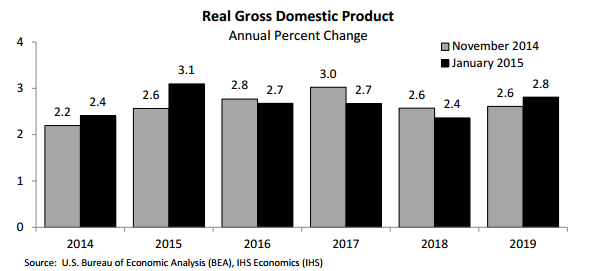Minnesota ended the 2014 calendar year on a high note. State revenues came in higher than expected for November and December, and the U.S.’s near-term economic outlook has improved, according to the January Economic Update from Minnesota Management and Budget.
For the last two months of 2014, revenues came in $212 million, or 6.4 percent, higher than projected in the state’s recent November forecast. Most of this difference came from higher income tax collections. However, MMB warns that this is likely due to early payments, rather than additional improvement in incomes.
News on the economic front shows some improvement from the November forecast. The nation’s GDP grew faster than expected during 2014, and growth was over 4 percent for two quarters in a row for the first time since 2003. Looking forward, the economy is expected to grow faster in 2015 than predicted in the November forecast. This is due in part to lower gas prices, which have freed up more income for other household needs.
Looking further out, predicted economic growth is slightly lower than expected in the November forecast. In 2016, projected growth is very similar to earlier projections, and in 2017 and 2018, while projections are lower, the economy is still expected to grow at 2.7 and 2.4 percent, respectively.

Forecasters continue to assign a 70 percent probability to their baseline forecast, with a 15 percent chance for more optimistic and pessimistic scenarios. In the pessimistic scenario, a weaker housing market is a drag on economic growth, and in the optimistic scenario, oil prices drop even more than expected and the U.S. economy receives a boost.
Our next look at state revenues and the economy will come in the February forecast. This is the information that legislators will use as their baseline as they set the upcoming budget in the 2015 Legislative Session. This update indicates that we might have a brighter situation in 2015, but this will unlikely significantly impact the state’s projected positive balance in the two upcoming biennia.
-Clark Biegler